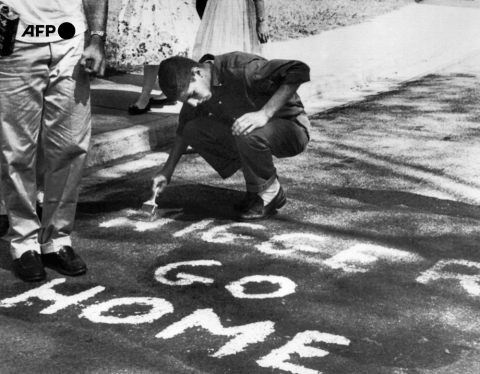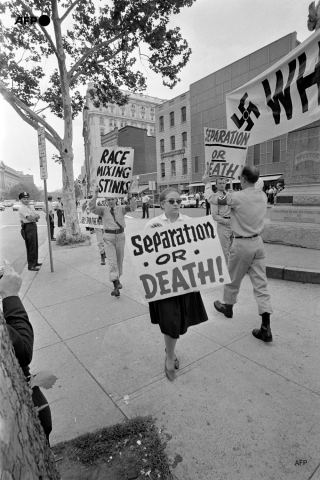Racism a part of daily life

Scenes of racism were part of daily life in the United States between 1956 and the early 1960s.
That was particularly so in the southern states, where organised resistance met the end of segregation that was ruled in 1954 by the Supreme Court.
Here are some examples drawn from stories by Agence France-Presse, translated from the original French.
- On buses -
TALLAHASSEE, Florida, March 4, 1957 (AFP) - Three black students from Florida's university of arts and crafts were today sentenced to 60 days in prison and a $500 fine -- the maximum provided for in law -- for having contravened laws on the segregation of races in the town's buses.
The three students' lawyer has announced that he will appeal.
- On stage -
HOUSTON, Texas, May 7, 1957 (AFP) - The Houston Post announces that the University of Texas has decided not to give the role of Dido in Purcell's opera "Dido and Aeneas" to Miss Barbara Smith, a young black student of 19.
Miss Smith was due to sing opposite a young white tenor. But some deputies in Texas said it would not be good for the university's reputation to give the roles of the legendary lovers to people of different races.
The university was opened to blacks for the first time last September.

- Forbidden love -
INDIANAPOLIS, Indiana, November 11, 1957 (AFP) - A juvenile court in Fort Wayne has sentenced a young black man and white woman, both aged 17, because they refused to stop seeing each other.
The man was sentenced to six months' detention in an agricultural reform institution and the woman was sent for an indefinite period to a school for delinquents.
They were arrested after the girl's mother filed a complaint.
- The colour of blood -
BATON ROUGE, Louisiana, July 17, 1958 (AFP) - The governor of Louisiana has signed a law obliging the American Red Cross to indicate on bottles of blood plasma the race of the blood donor.
The law is not applicable in exceptional emergency cases.
- In restaurants -
MONTGOMERY, Alabama, June 8, 1960 (AFP) - Seven blacks and one white have been sentenced by a Montgomery Court to a fine of $100 each for having lunch together in a city restaurant in March.
The judge said the lunch represented a provocative act designed to spark an incident given the racial tension in Montgomery (...).
At the outset, 13 whites were accused but 12 were acquitted in a separate trial.
